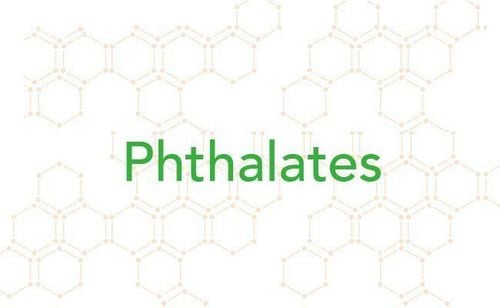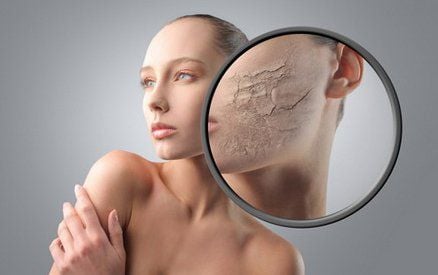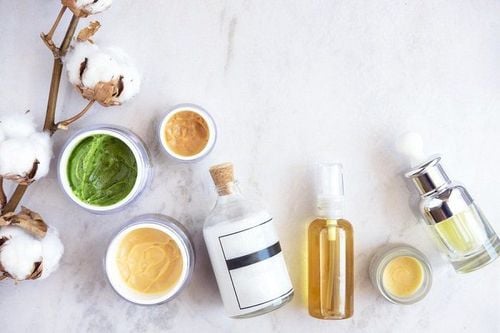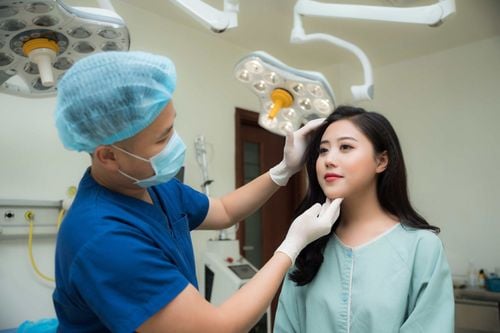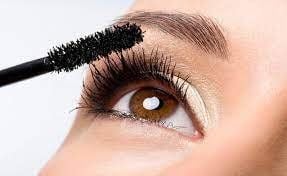This is an automatically translated article.
You can take care of your skin with products that smell good, you feel good and because everyone is using it. But is it safe for you? So what should you pay attention to when choosing good and safe cosmetics for skin care?
It's hard to choose shampoos, lotions and other personal skin care products because of the controversy over chemicals like triclosan, phthalates, parabens, formaldehyde and musk. These substances are found in many personal skin care products.
While some manufacturers voluntarily remove some of these controversial chemicals from their products, you'll still find some in most cosmetics, from moisturizers to makeup the point.
Pre-sale safety testing does not have to be done for cosmetics or personal skin care products. So some risks can still be found. Here are the chemicals in cosmetics that are commonly used, have been controversial about their safety.
1. Should skin care products contain phthalates?
Phthalates act as emollients in personal skin care products such as cosmetics, perfumes, and shampoos. Phthalates have also been found as plasticizers in children's toys.
Some studies have found that phthalates can have a number of effects on hormones, specifically exposure to high doses of phthalates can disrupt hormone production in the body.
Despite this, some people believe that with smaller exposures, phthalates are still safe to use. But the fact is that phthalates are everywhere, even in dust, so low levels of phthalates can be found in the human body. Some evidence suggests that exposure to skin care products containing phthalates in humans may be associated with low sperm count and quality, and impaired production of testosterone, the sex hormone in men.
In addition, exposure in pregnant women was also found to be associated with very small changes in genital formation in boys.
Currently, baby skin care products such as shampoo, talcum powder, lotion are found to contain phthalates. Therefore, urine tests showed high levels of phthalates in the urine of children.
Experts have advised that phthalates should be avoided so that the chemical does not enter the bloodstream. However, choosing products that do not contain phthalates is actually quite difficult because phthalates are not listed in the list of trusted ingredients on the product label.
It is often difficult to know if phthalates are present in a skin care product because manufacturers are not required to list specific chemicals in a product, especially cosmetic fragrances, which often contain May contain phthalates to help make the scent last longer.
So just to be sure, look for products that say “phthalates-free” or “phthalate-free” on the label. Either choose products that are fragrance-free, or if you want to use scented products, choose ones that contain essential oils like lavender and citrus.
Finally, in order to buy safe cosmetics, it is necessary to check the ingredients of the product on the cosmetic database website.
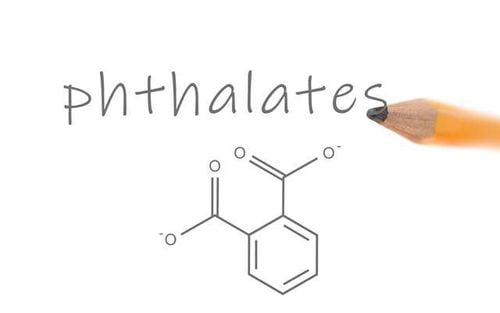
Phthalates hoạt động như chất làm mềm trong các sản phẩm chăm sóc da
2. Should skin care products contain formaldehyde?
Formaldehyde is a chemical with an unpleasant odor that can be found in some cosmetics and personal products such as skin care. This chemical is also controversial about its safety for human health when used, but at lower levels.Some studies show that short-term exposure to formaldehyde can cause skin irritation, wheezing, watery eyes, and burning in the nose if inhaled. The long-term effects are uncertain. However, research bodies have classified the chemical as a "possibly carcinogenic."
Despite this, the amount of formaldehyde used in skin care cosmetics is much smaller than the amount tested in studies, so it is difficult to draw firm conclusions about the risks posed by the chemical. caused by this substance.
Avoiding products containing formaldehyde is not easy because research groups have found this substance in children's products such as lotions, shower gels, shampoos, however, they are not intentionally added by the manufacturer but is a by-product of the manufacturing process.
3. Should skin care products contain parabens?
Parabens are a common chemical most commonly used in cosmetics such as moisturizers, shampoos, conditioners, shaving creams, and makeup. They act as a preservative to prevent bacterial growth, ensuring the product is not contaminated with bacteria or fungi and spoils, affecting the health of consumers.Studies have found parabens in breast cancer tissue samples. However, the study did not show a direct link between exposure to paraben-containing skin care products and breast cancer risk.
Parabens are commonly used in concentrations from 0.01% - 0.3% and are considered safe in cosmetics. Therefore, do not have to worry about parabens in cosmetics. But to ensure consumer safety, the US Food and Drug Administration (FDA) continues to evaluate and review studies on this chemical.
If you are concerned about the safety of a skin care product that contains parabens, remove the substance from the product you intend to purchase by carefully reading the ingredient list printed on the product label and looking for ingredients such as: propylparaben, benzylparaben, methylparaben or butylparaben.
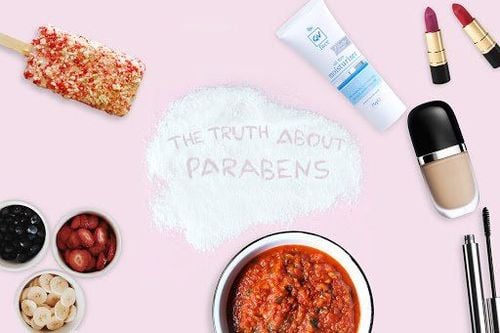
Paraben thường được sử dụng ở nồng độ từ 0,01% - 0,3%
4. Should skin care products containing triclosan be used?
Triclosan is found in antibacterial soaps, but in reality, these products do not reduce bacteria or prevent disease spread better than conventional hand sanitizers. Even long-term use of antibacterial skin care products containing triclosan can contribute to the emergence of antibiotic-resistant "superbugs",
Scientists have warned about the Using products containing triclosan can have an impact on the environment as millions of tons of this chemical are found to be released into waterways each year.
To ensure the safety of consumers and the environment, experts recommend against buying skin care products that contain triclosan or triclocarban, which are the most common antibacterial chemicals.
However, this is difficult because not all products list the ingredients. So it's best to safely avoid products that are advertised as "antibacterial". Instead, use soap to wash your hands and water to rinse as usual.
5. Search and choose healthy cosmetics
According to the FDA, cosmetic manufacturers can use any ingredient except some that are prohibited by regulation. However, to ensure their own safety, consumers can check products to see if the chemicals listed above such as phthalates, parabens, triclosan and formaldehyde are available by accessing the database. data on cosmetic safety specialized in skin care.
According to the online guide, consumers can review the safety of more than 7,600 ingredients found in nearly 62,000 products. From there, narrow the field of cosmetics to find products that are safer.
Skin care with safe products should avoid choosing cosmetics that contain parabens, triclosan, phthalates and formaldehyde by carefully reading the information on the product label.
Please dial HOTLINE for more information or register for an appointment HERE. Download MyVinmec app to make appointments faster and to manage your bookings easily.
Reference source: webmd.com



